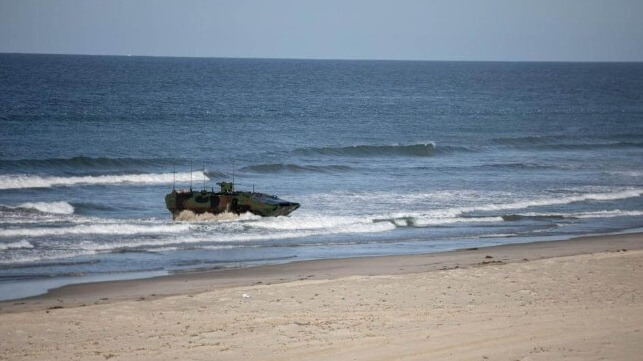Marine Corps Pauses Assault Vehicle Training After Surf Accident

The U.S. Marine Corps has paused waterborne operations for its newly-acquired ACV amphibious assault vehicle after one rolled over and one more was disabled in heavy surf at Camp Pendleton, California.
On Tuesday, two ACVs were headed for the beach at Camp Pendleton during a routine exercise. At the time, a National Weather Service heavy surf advisory was in effect for the southern California coastline. A major storm system in the South Pacific had created swells and high surf conditions in Hawaii, the mid-Pacific islands, and the southern stretch of the U.S. West Coast.
The advisory warned of peak wave heights of up to 9-10 feet in the surf zone, and the APV is rated for operations in wave heights of up to four feet. A video of the incident obtained by USNI News (below) shows that one of the APVs rolled over in the surf, and a second was overtopped by a breaking wave. The crews safely abandoned both vehicles and made it back to shore. The video shows that two small rescue boats were standing by in the surf to assist as needed, as per protocol.
In response, the Marine Corps has temporarily halted ACV waterborne operations for an investigation and will "ensure the assault amphibian community can review best practices and procedures to remain capable, safe, and ready," the service said in a statement. Shoreside ACV training will continue as before.
The accident had a far better outcome than the last amphibious vehicle casualty reported by the Marine Corps. Two years ago, on July 30, 2020, a previous-generation amphibious assault vehicle (AAV) capsized and sank during an exercise off San Clemente Island, California. The vehicle was hit by a wave and went down rapidly, leaving five crewmembers on the surface and the rest trapped inside. Eight died in the vehicle, many still wearing combat gear, and one died later of injuries sustained in the accident. The post-accident investigation found a litany of problems, including a lack of safety training, leaking seals, disabled emergency-exit lights and missing safety patrol boats.
In the wake of the 2020 casualty, several senior officers were removed from their posts, including the commander of the unit's battalion and the commanding officer of the 15th Marine Expeditionary Unit.
